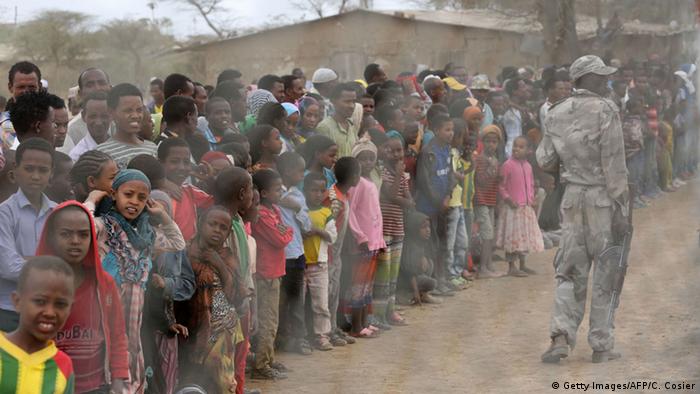Date: Mon, 8 Feb 2016 21:23:56 +0100
Millions of people are on the brink of famine across the Horn of Africa and South Sudan. The crisis in Ethiopia is driven by drought, in Somalia by drought and war; in South Sudan, it is driven exclusively by war.
War and natural disasters are joining forces to put millions of people in danger of starvation across the Horn of Africa and South Sudan, where millions are on the verge of famine.
More than 10 million people in Ethiopia need food aid, a figure the UN warns could double within months – leaving 20 percent of the population hungry.
The country is being plagued by the worst drought in more than 30 years, brought on by the naturally recurring phenomena known as El Nino, in which Pacific Ocean surface temperatures heat up.
The warm ocean currents - which reemerge periodically - alter weather patterns, causing drought in some parts of the globe and flooding elsewhere.
Ethiopia and neighboring Somalia have been racked by drought, but in the case of the latter, where 4.7 million people (40 percent of the population) need food aid, war has joined forces with nature to plant the seeds of disaster.
Of those 4.7 million, 950,000 of the most severely affected "struggle every day to meet their food needs," the UN said.
"The food security and malnutrition situation in Somalia is alarming, especially in parts of Puntland and Somaliland, which have been hard hit by drought exacerbated by El Nino," the UN said.
Call for money
The international organization is calling for $885 million (792 million euros) in aid.
"We are deeply concerned... with severe drought conditions intensifying in Puntland and Somaliland, many more people risk relapsing into crisis," the UN said.
There the natural disaster is being exacerbated by a man-made disaster: war.
Somalia's military, backed by 20,000 African Union forces, continues battling Al-Qaeda linked Shebab insurgents across the country.
On Ethiopia's western flank, South Sudan's food crisis is almost entirely man-made as warring factions continue fighting and blocking international food aid.
The situation is most critical for 40,000 people on the brink of famine in the north-central part of the country. But the UN says another 2.8 million people, nearly a quarter of South Sudan's population, are also hungry.
"Nearly 25 percent of the country's population remain in urgent need of food assistance, and at least 40,000 people are on the brink of catastrophe," the UN's Food and Agriculture Organization, the UN children's agency UNICEF and the World Food Program said in a joint statement.
"Families have been doing everything they can to survive, but they are now running out of options," said UNICEF country chief Jonathan Veitch. "Many of the areas where the needs are greatest are out of reach because of the security situation. It is crucial that we are given unrestricted access now."
bik/jil (AFP, dpa)
